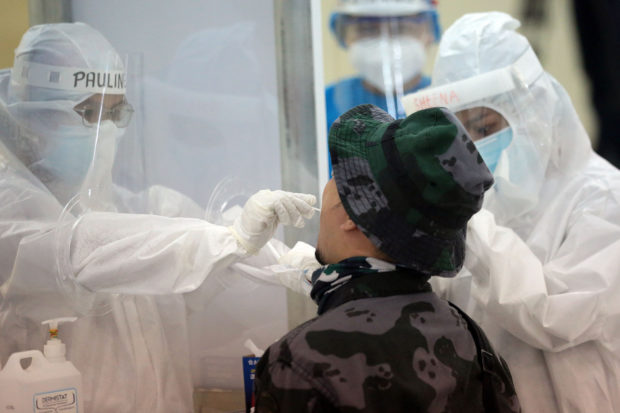
SWAB TESTS Health workers collect swab sample from a front-liner. (Photo by GRIG C. MONTEGRANDE / Philippine Daily Inquirer)
MANILA, Philippines — The government has required the private sector to pay for the testing of employees with COVID-19 symptoms, but business groups are worried this might be a burden on small companies, some of whom might rather opt to remain closed than pay too high a cost.
The Department of Labor and Employment (DOLE) has issued a labor advisory that has officially placed on the private sector the burden of shouldering the costs of COVID-19 preventive and control measures, including testing, disinfection facilities and personal protective equipment.
Labor Advisory No. 18, was issued on Monday, the first day that most businesses in areas under modified enhanced community quarantine were allowed to resume operations.
Earlier, the Department of Health and DOLE said employees were not required to undergo COVID-19 testing before returning to their workplace.
The Employers Confederation of the Philippines (Ecop), however, has pressed the government to provide for the mass testing of employees, since most businesses do not have enough resources to finance it.
But Malacañang said the government would not shoulder the costs of mass testing for employees because of a lack of resources, particularly test kits and accredited testing laboratories.
However, employers and local government units may implement mass testing if they have the capacity to do so, it said.
“If they don’t have the capacity, then workers should not be required to go to work,” said presidential spokesperson Harry Roque.
Trade Secretary Ramon Lopez said the “national government does not require testing of all employees before they return to work.”
However, he said paying for the cost of testing should be part of the private sector’s new normal.
“PCR [polymerase chain reaction] testing is not required for all but only for those who are symptomatic and are suspected of having COVID-19,” Lopez said.
Some business groups are, however, worried about the impact of the policy on micro, small and medium-sized enterprises, which had been struggling to stay alive since many of them were forced to shut down since they were not considered essential.
Sergio Ortiz-Luis Jr., president of the Ecop, said that smaller companies would not open if the costs—such as temporary housing, shuttle services and testing — were too high.
“At the end of the day, if they can’t follow the [government] requirements and they’re not sure if they should open again their business, then they won’t open, especially the smaller ones,” Luis said. INQ